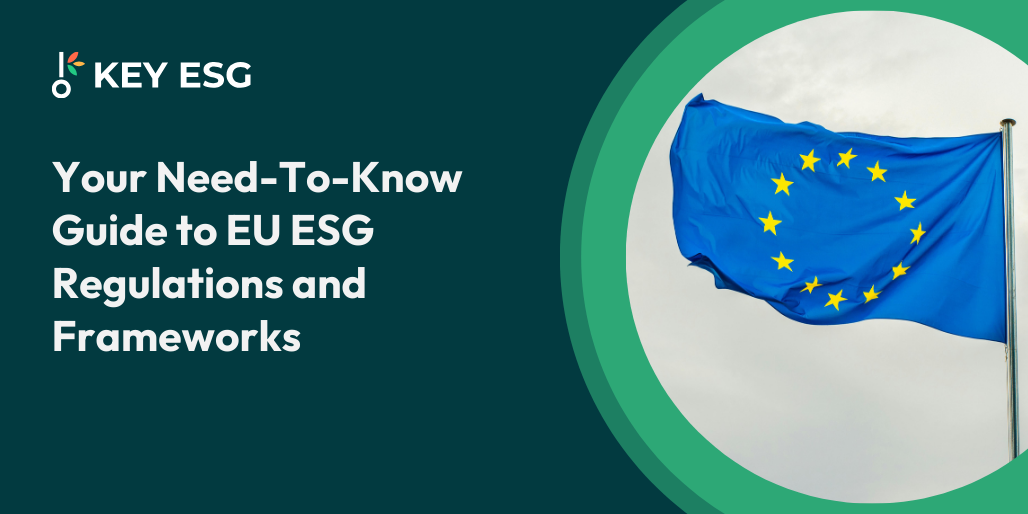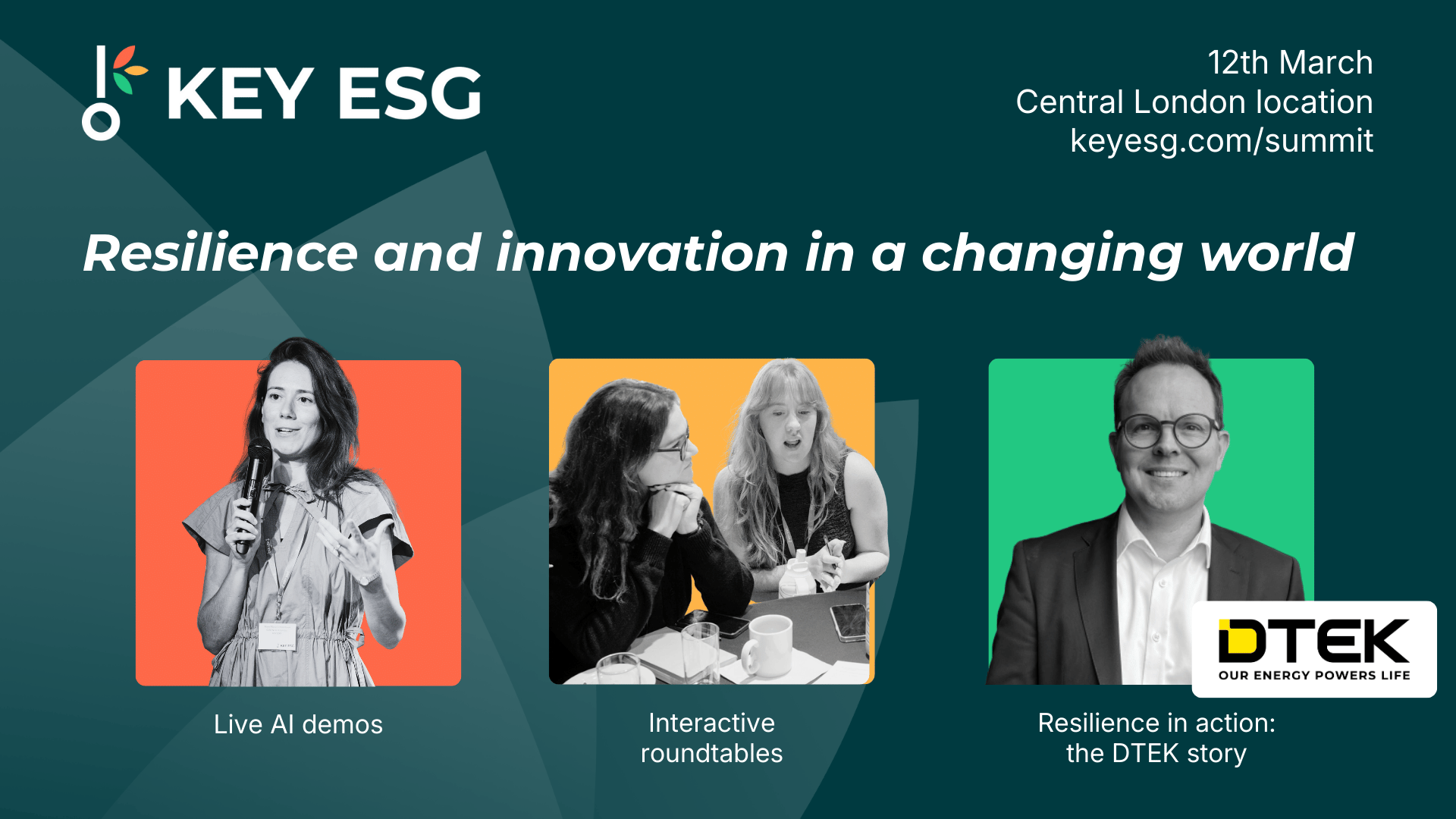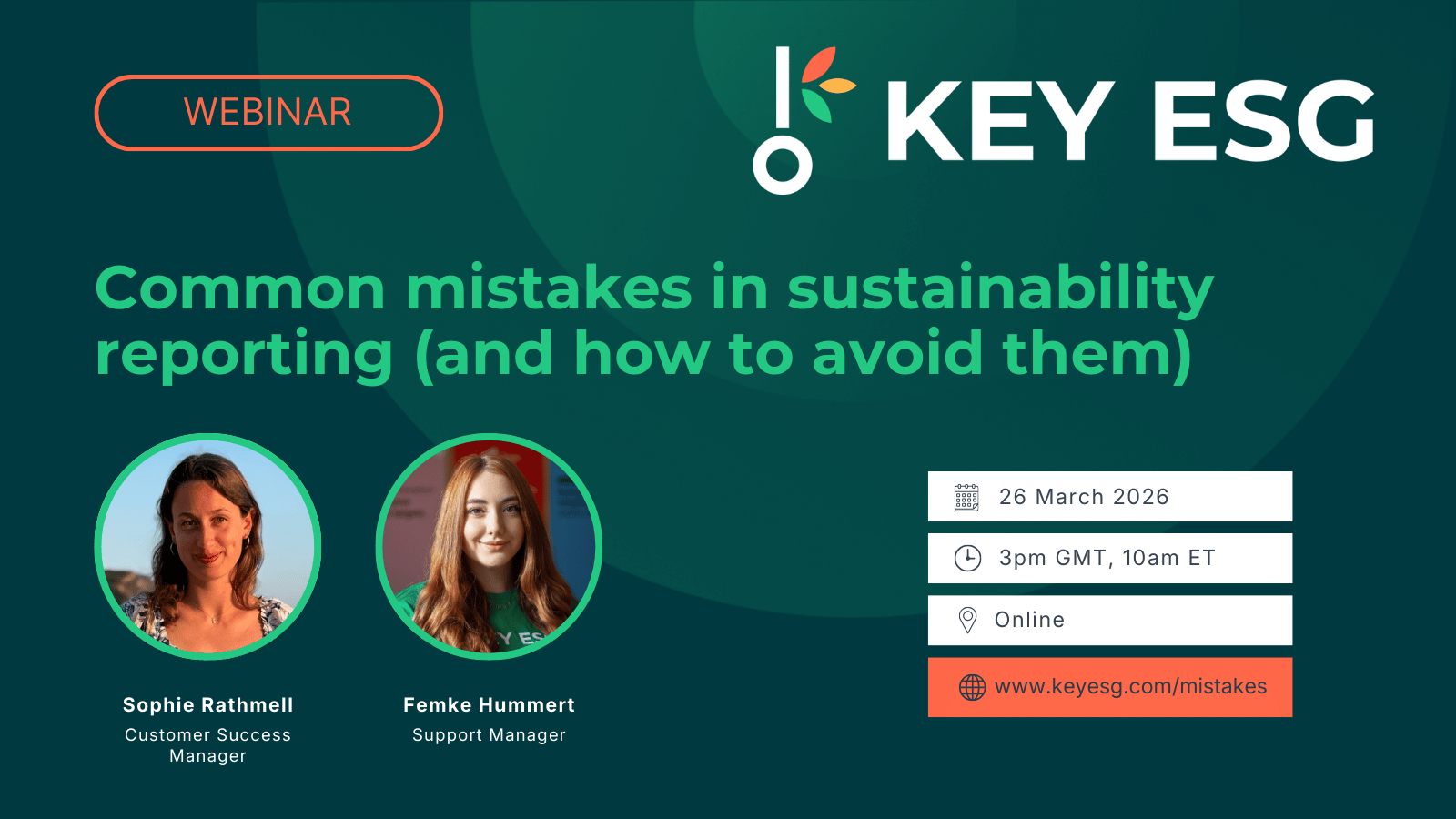Organisations face mounting regulatory, consumer, and stakeholder pressure to demonstrate measurable progress on their sustainability goals. According to Morgan Stanley research, over 80% of companies now recognise sustainability as a long-term opportunity to create value, and 85% of executives can already calculate the ROI of their sustainability initiatives. As a result, organisations must adopt reliable systems for tracking, reporting, and improving sustainability performance.
Given sustainability software’s ability to help organisations build repeatable reporting processes, improve and centralise their sustainability data, and improve internal and external communication around sustainability, it’s unsurprising that the largest number of voters in Economist Impact’s survey (41%) said that ESG data and reporting software would be their biggest expenditure in relation to sustainability projects.
To satisfy this growing demand for sustainability management software, this article will deliver high-level insights about the key factors procurement leaders should prioritise when selecting the right vendor. For a detailed procurement guide with over 60 carefully curated questions to help organisations select the right sustainability software, submit your details below to download the whitepaper.
The role of enterprise procurement in sustainability success
Procurement teams are at the heart of a company’s efforts to drive sustainability. They ensure the organisation has the right tools to implement its sustainability goals. This includes a software buying process that considers the following headline elements:
Cost & value delivery
Procurement looks beyond upfront costs to include implementation, training, and maintenance, ensuring the software delivers both financial justification and sustainability impact over its full lifecycle.
Risk & compliance management
They reduce reputational and financial risks by verifying vendor ESG claims, ensuring data security, and aligning purchases with regulations and reporting standards.
Cross-organisational collaboration & process enhancement
Procurement connects sustainability, finance, IT, and operations, ensuring the software meets strategic ESG goals while also being practical and effective for day-to-day use.
Strategic values alignment
Procurement will ensure the software provider has the relevant track record and experience to satisfy an enterprise’s demands.
The challenges of sustainability software procurement for enterprises
While there are various reasons why enterprises need sustainability software, there are some challenges to consider during the procurement process.
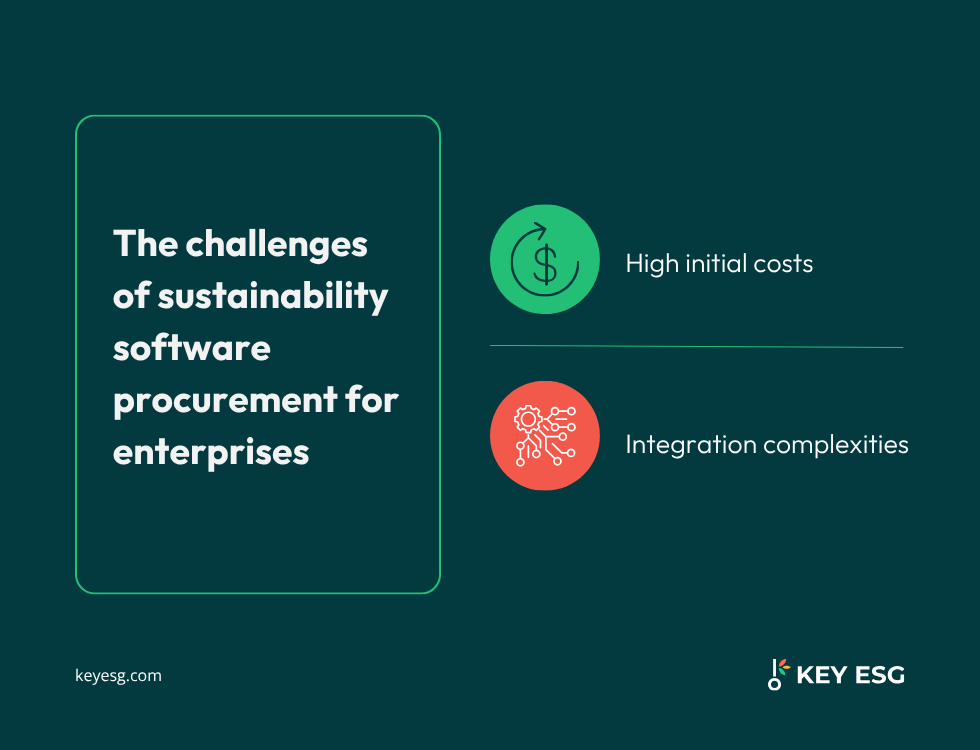
High initial costs
While sustainability software offers long-term benefits, the upfront investment can be significant. For many enterprises, the initial cost of purchasing and implementing software and training staff may be a barrier to adoption. However, the return on investment (ROI) often outweighs these costs over time through improved efficiency and risk mitigation.
Selecting a sustainability software provider that can support during the onboarding phase is essential to ensure a smooth setup and training.
Integration complexities
Enterprises have complex data structures and use myriad business software solutions. Integrating new sustainability software into existing systems can be complex. Data migration, system compatibility, and user training may require additional resources and time, creating challenges during implementation.
To future-proof your organization's sustainability data management processes, it is highly recommended that you select a sustainability software provider with the right data integration capabilities, such as API in-and-out integrations.
Exposure to possible non-compliance risk
Global organisations face various different regulatory reporting obligations, depending on which jurisdictions they operate in. Sustainability regulations continue to evolve and organisations who do not stay abreast of the changes expose themselves to non-compliance risk. Paired with this is the requirement for increasingly high-quality, auditable sustainability data from regulators and stakeholders alike. When selecting a sustainability software provider, it’s essential to ensure they are regulatory experts and will keep your organisation compliant with the relevant regulatory changes. Additionally, the provider must provide the structure and fail-over processes to ensure your organisation’s sustainability data is highly-accurate and auditable
Factors for procurement to consider in sustainability software procurement processes
Choosing the right software to enable an enterprise to deliver on its sustainability objectives can be complicated, especially for enterprises that do not have sustainability values embedded into their central value-creation strategy.
Here are the top factors to consider before implementing sustainability software.
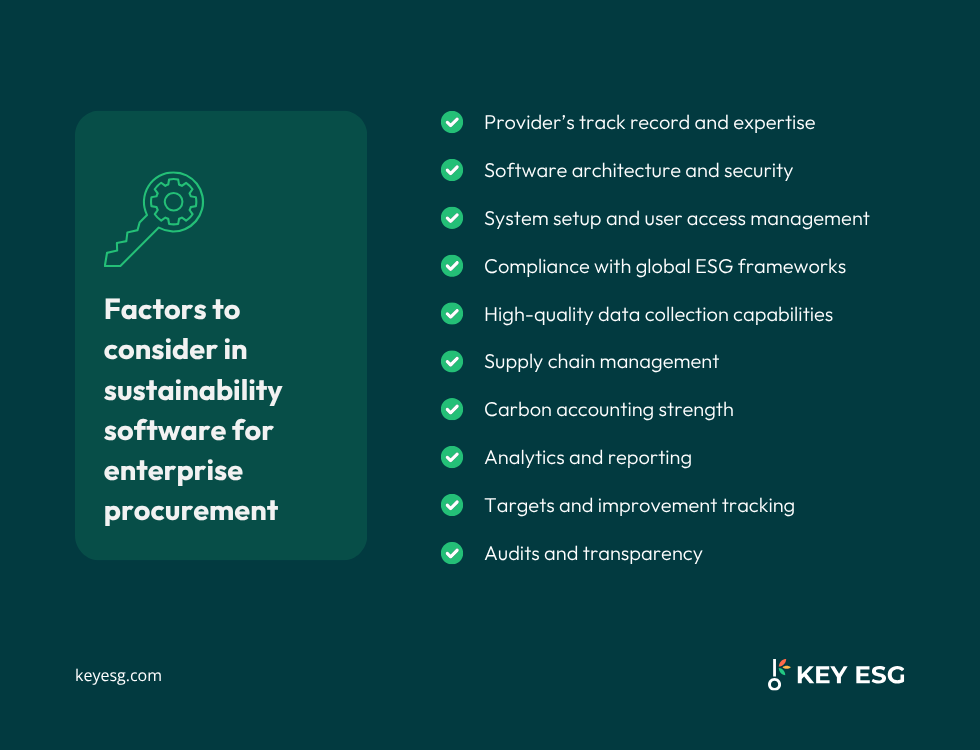
Provider’s track record and expertise
When choosing sustainability software, procurement leaders should assess the provider’s experience, credibility, and track record in implementing sustainable procurement initiatives at scale. Providers with proven expertise across industries understand the social and economic factors that shape global sustainability performance. Equally important is user-friendliness - intuitive design, responsive support, and clear onboarding help teams adopt the system quickly and maximise ROI.
Business Value: A trusted, experienced provider reduces implementation risks and ensures continuous improvement through expert guidance and accessible support, driving faster adoption and measurable sustainability performance.
Software architecture and security
Robust architecture and strong data security are essential for compliance and resilience. Sustainability software should integrate seamlessly with existing ERP, procurement, and finance systems, enabling real-time data flow across departments. This level of interoperability enhances accuracy, while enterprise-grade security safeguards sensitive ESG and supply chain information - a priority for global companies managing complex data environments.
Business Value: A secure, integrated system improves data reliability, reduces manual workload, and protects against compliance breaches, ensuring consistent and trustworthy sustainability reporting.
System setup and user access management
Configurable user permissions and access controls are key for large enterprises managing complex sustainability programs. Procurement leaders should look for platforms that allow flexible setup - from defining user roles to managing approval workflows - while maintaining full audit trails for accountability.
Business Value: Streamlined setup and controlled access empower procurement professionals to collaborate effectively, maintain data integrity, and ensure compliance across departments and geographies.
Compliance with global ESG frameworks
Global frameworks are raising the bar for sustainability reporting from the EU’s CSRD, to IFRS S1/S2 Standards to the California Climate Disclosure Laws. Software must support compliance with these evolving regulations by enabling interoperability, reducing duplication of reporting tasks, and producing audit-ready outputs aligned with the regulations as they evolve.
Business Value: Automated compliance tools reduce non-conformance risk, simplify audits, and give procurement teams confidence that their reporting meets international ESG standards.
High-quality data collection capabilities
Effective sustainability management depends on accurate, consistent, and comprehensive data. The right software centralises inputs from multiple sources - carbon emissions, energy use, labour data, and supplier assessments - into a single source of truth. This enables procurement teams to maintain transparency and build a robust foundation for ESG analysis.
Business Value: Streamlined and accurate data collection enhances decision-making, simplifies reporting, and improves organisation and supply chain accountability.
Supply chain management
Procurement leaders need visibility into every tier of their supply chain to assess environmental and social performance. Software with supplier traceability and sustainable supply chain management tools enables teams to evaluate vendor compliance, benchmark ESG progress, and embed sustainable practices into sourcing decisions. It also helps identify and collaborate with sustainable suppliers who share the company’s values.
Business Value: Improved traceability strengthens relationships with responsible suppliers, reduces supply chain risks, and drives continuous improvement through sustainable procurement practices.
Carbon accounting strength
Accurate carbon accounting is fundamental to achieving net-zero goals. Leading software automates Scope 1, 2, and 3 carbon emissions tracking, applying the GHG Protocol to ensure consistency. Procurement teams can use these insights to identify hotspots, engage suppliers, and design reduction strategies that align with a sustainable procurement strategy.
Business Value: Advanced carbon accounting tools deliver audit-ready insights, support emissions reduction planning, and enhance transparency across the enterprise.
Analytics and reporting
Comprehensive analytics allow organisations to visualise trends, measure performance, and communicate sustainability results effectively. Integrated dashboards and automated reporting functions enable procurement leaders to share progress with internal and external stakeholders while supporting continuous improvement.
Business Value: Real-time insights empower data-driven decisions, improving efficiency, compliance, and stakeholder confidence in sustainability outcomes.
Targets and improvement tracking
Sustainability is a journey, not a one-off project. Software should help enterprises set measurable goals, monitor progress, and adjust action plans over time. Platforms like KEY ESG enable procurement teams to align targets with corporate objectives and ESG frameworks for continuous performance optimisation.
Business Value: Structured goal-setting and progress tracking ensure accountability, foster long-term supplier engagement, and keep sustainability strategies aligned with business growth and sustainable sourcing priorities.
Audits and transparency
Transparency underpins trust. Leading sustainability platforms capture complete audit trails, allowing teams to verify data accuracy and respond quickly to external reviews. Organisation leaders can ensure consistent and compliant sustainability disclosures, improving credibility with investors, regulators, and customers.
Business Value: Enhanced transparency strengthens reputation, supports external assurance, and enables reliable reporting that stands up to regulatory scrutiny.
Choose KEY ESG to make sustainability a competitive advantage
Sustainability is no longer a box-ticking exercise - it’s a defining factor in business success. For procurement leaders, the right technology partner can determine how effectively sustainability strategies translate into measurable outcomes.
KEY ESG provides a single, scalable platform that enables organisations to manage data, ensure compliance, and drive continuous improvement across their sustainability operations. Designed with procurement teams in mind, it supports sustainable procurement initiatives, enhances supplier traceability, and simplifies reporting under global frameworks such as CSRD, IFRS, and the California Climate Disclosure Laws.
By embedding sustainability into everyday decision-making and accelerating ESG initiatives, KEY ESG helps enterprises strengthen sustainable sourcing, reduce carbon emissions, and improve overall sustainability performance. Its integrated tools also help monitor governance criteria, ensuring transparency, accountability, and consistency across the supply chain.
For a detailed procurement guide including over 60 carefully curated questions to help your organisation select the right sustainability software provider, submit your details below.
Ready to procure the right sustainability software? Request a demo today.
Organisations face mounting regulatory, consumer, and stakeholder pressure to demonstrate measurable progress on their sustainability goals. According to Morgan Stanley research, over 80% of companies now recognise sustainability as a long-term opportunity to create value, and 85% of executives can already calculate the ROI of their sustainability initiatives. As a result, organisations must adopt reliable systems for tracking, reporting, and improving sustainability performance.
Given sustainability software’s ability to help organisations build repeatable reporting processes, improve and centralise their sustainability data, and improve internal and external communication around sustainability, it’s unsurprising that the largest number of voters in Economist Impact’s survey (41%) said that ESG data and reporting software would be their biggest expenditure in relation to sustainability projects.
To satisfy this growing demand for sustainability management software, this article will deliver high-level insights about the key factors procurement leaders should prioritise when selecting the right vendor. For a detailed procurement guide with over 60 carefully curated questions to help organisations select the right sustainability software, submit your details below to download the whitepaper.
The role of enterprise procurement in sustainability success
Procurement teams are at the heart of a company’s efforts to drive sustainability. They ensure the organisation has the right tools to implement its sustainability goals. This includes a software buying process that considers the following headline elements:
Cost & value delivery
Procurement looks beyond upfront costs to include implementation, training, and maintenance, ensuring the software delivers both financial justification and sustainability impact over its full lifecycle.
Risk & compliance management
They reduce reputational and financial risks by verifying vendor ESG claims, ensuring data security, and aligning purchases with regulations and reporting standards.
Cross-organisational collaboration & process enhancement
Procurement connects sustainability, finance, IT, and operations, ensuring the software meets strategic ESG goals while also being practical and effective for day-to-day use.
Strategic values alignment
Procurement will ensure the software provider has the relevant track record and experience to satisfy an enterprise’s demands.
The challenges of sustainability software procurement for enterprises
While there are various reasons why enterprises need sustainability software, there are some challenges to consider during the procurement process.

High initial costs
While sustainability software offers long-term benefits, the upfront investment can be significant. For many enterprises, the initial cost of purchasing and implementing software and training staff may be a barrier to adoption. However, the return on investment (ROI) often outweighs these costs over time through improved efficiency and risk mitigation.
Selecting a sustainability software provider that can support during the onboarding phase is essential to ensure a smooth setup and training.
Integration complexities
Enterprises have complex data structures and use myriad business software solutions. Integrating new sustainability software into existing systems can be complex. Data migration, system compatibility, and user training may require additional resources and time, creating challenges during implementation.
To future-proof your organization's sustainability data management processes, it is highly recommended that you select a sustainability software provider with the right data integration capabilities, such as API in-and-out integrations.
Exposure to possible non-compliance risk
Global organisations face various different regulatory reporting obligations, depending on which jurisdictions they operate in. Sustainability regulations continue to evolve and organisations who do not stay abreast of the changes expose themselves to non-compliance risk. Paired with this is the requirement for increasingly high-quality, auditable sustainability data from regulators and stakeholders alike. When selecting a sustainability software provider, it’s essential to ensure they are regulatory experts and will keep your organisation compliant with the relevant regulatory changes. Additionally, the provider must provide the structure and fail-over processes to ensure your organisation’s sustainability data is highly-accurate and auditable
Factors for procurement to consider in sustainability software procurement processes
Choosing the right software to enable an enterprise to deliver on its sustainability objectives can be complicated, especially for enterprises that do not have sustainability values embedded into their central value-creation strategy.
Here are the top factors to consider before implementing sustainability software.

Provider’s track record and expertise
When choosing sustainability software, procurement leaders should assess the provider’s experience, credibility, and track record in implementing sustainable procurement initiatives at scale. Providers with proven expertise across industries understand the social and economic factors that shape global sustainability performance. Equally important is user-friendliness - intuitive design, responsive support, and clear onboarding help teams adopt the system quickly and maximise ROI.
Business Value: A trusted, experienced provider reduces implementation risks and ensures continuous improvement through expert guidance and accessible support, driving faster adoption and measurable sustainability performance.
Software architecture and security
Robust architecture and strong data security are essential for compliance and resilience. Sustainability software should integrate seamlessly with existing ERP, procurement, and finance systems, enabling real-time data flow across departments. This level of interoperability enhances accuracy, while enterprise-grade security safeguards sensitive ESG and supply chain information - a priority for global companies managing complex data environments.
Business Value: A secure, integrated system improves data reliability, reduces manual workload, and protects against compliance breaches, ensuring consistent and trustworthy sustainability reporting.
System setup and user access management
Configurable user permissions and access controls are key for large enterprises managing complex sustainability programs. Procurement leaders should look for platforms that allow flexible setup - from defining user roles to managing approval workflows - while maintaining full audit trails for accountability.
Business Value: Streamlined setup and controlled access empower procurement professionals to collaborate effectively, maintain data integrity, and ensure compliance across departments and geographies.
Compliance with global ESG frameworks
Global frameworks are raising the bar for sustainability reporting from the EU’s CSRD, to IFRS S1/S2 Standards to the California Climate Disclosure Laws. Software must support compliance with these evolving regulations by enabling interoperability, reducing duplication of reporting tasks, and producing audit-ready outputs aligned with the regulations as they evolve.
Business Value: Automated compliance tools reduce non-conformance risk, simplify audits, and give procurement teams confidence that their reporting meets international ESG standards.
High-quality data collection capabilities
Effective sustainability management depends on accurate, consistent, and comprehensive data. The right software centralises inputs from multiple sources - carbon emissions, energy use, labour data, and supplier assessments - into a single source of truth. This enables procurement teams to maintain transparency and build a robust foundation for ESG analysis.
Business Value: Streamlined and accurate data collection enhances decision-making, simplifies reporting, and improves organisation and supply chain accountability.
Supply chain management
Procurement leaders need visibility into every tier of their supply chain to assess environmental and social performance. Software with supplier traceability and sustainable supply chain management tools enables teams to evaluate vendor compliance, benchmark ESG progress, and embed sustainable practices into sourcing decisions. It also helps identify and collaborate with sustainable suppliers who share the company’s values.
Business Value: Improved traceability strengthens relationships with responsible suppliers, reduces supply chain risks, and drives continuous improvement through sustainable procurement practices.
Carbon accounting strength
Accurate carbon accounting is fundamental to achieving net-zero goals. Leading software automates Scope 1, 2, and 3 carbon emissions tracking, applying the GHG Protocol to ensure consistency. Procurement teams can use these insights to identify hotspots, engage suppliers, and design reduction strategies that align with a sustainable procurement strategy.
Business Value: Advanced carbon accounting tools deliver audit-ready insights, support emissions reduction planning, and enhance transparency across the enterprise.
Analytics and reporting
Comprehensive analytics allow organisations to visualise trends, measure performance, and communicate sustainability results effectively. Integrated dashboards and automated reporting functions enable procurement leaders to share progress with internal and external stakeholders while supporting continuous improvement.
Business Value: Real-time insights empower data-driven decisions, improving efficiency, compliance, and stakeholder confidence in sustainability outcomes.
Targets and improvement tracking
Sustainability is a journey, not a one-off project. Software should help enterprises set measurable goals, monitor progress, and adjust action plans over time. Platforms like KEY ESG enable procurement teams to align targets with corporate objectives and ESG frameworks for continuous performance optimisation.
Business Value: Structured goal-setting and progress tracking ensure accountability, foster long-term supplier engagement, and keep sustainability strategies aligned with business growth and sustainable sourcing priorities.
Audits and transparency
Transparency underpins trust. Leading sustainability platforms capture complete audit trails, allowing teams to verify data accuracy and respond quickly to external reviews. Organisation leaders can ensure consistent and compliant sustainability disclosures, improving credibility with investors, regulators, and customers.
Business Value: Enhanced transparency strengthens reputation, supports external assurance, and enables reliable reporting that stands up to regulatory scrutiny.
Choose KEY ESG to make sustainability a competitive advantage
Sustainability is no longer a box-ticking exercise - it’s a defining factor in business success. For procurement leaders, the right technology partner can determine how effectively sustainability strategies translate into measurable outcomes.
KEY ESG provides a single, scalable platform that enables organisations to manage data, ensure compliance, and drive continuous improvement across their sustainability operations. Designed with procurement teams in mind, it supports sustainable procurement initiatives, enhances supplier traceability, and simplifies reporting under global frameworks such as CSRD, IFRS, and the California Climate Disclosure Laws.
By embedding sustainability into everyday decision-making and accelerating ESG initiatives, KEY ESG helps enterprises strengthen sustainable sourcing, reduce carbon emissions, and improve overall sustainability performance. Its integrated tools also help monitor governance criteria, ensuring transparency, accountability, and consistency across the supply chain.
For a detailed procurement guide including over 60 carefully curated questions to help your organisation select the right sustainability software provider, submit your details below.
Ready to procure the right sustainability software? Request a demo today.




